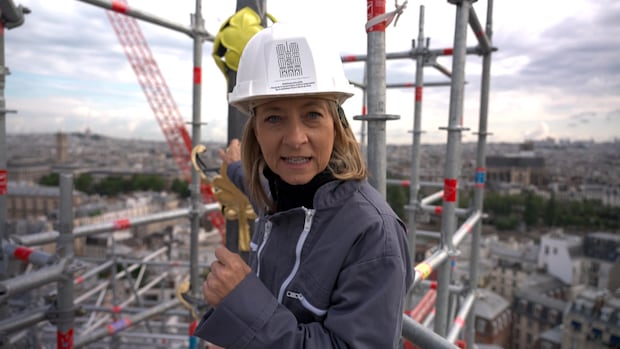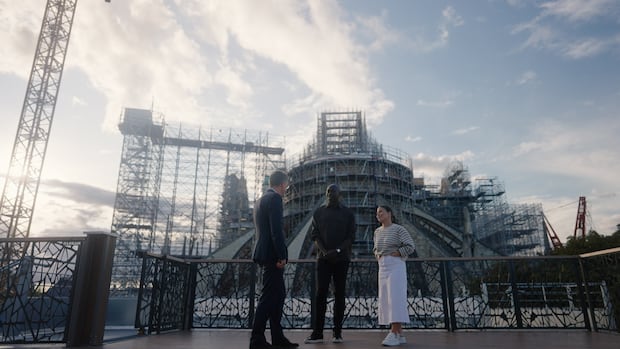
With just days to go until the opening ceremony of the Olympic Games in Paris, many people may be casting their minds back to more than five years ago, when the city’s treasured Notre-Dame Cathedral was engulfed in flames.
It was the evening of April 15, 2019, perhaps the last time so many eyes of the world were fixed on the French capital. Parisians themselves flocked in person to see their more than 800-year-old church burning. Many watched in horror as the iconic spire collapsed, and the wooden roof fell in.
To this day, there is no clear answer as to what caused the fire. There’s suspicion it could have been a cigarette left burning, or an electrical short that sparked the blaze.
Within days of the incident, French President Emmanuel Macron vowed the repair could be accomplished in about five years.
The rebuilding and restoration won’t be ready quite in time for the Olympics, but — in a bold and ambitious deadline — it’s scheduled to be soon after, set to reopen to the public on Dec. 8.
Over the last several years, few outside the organization tasked with rebuilding the historic landmark have been allowed onto the construction site and up onto the scaffolding. But, months ahead of the official reopening, CBC News obtained rare permission to do just that.
The famous Notre-Dame cathedral in Paris is rising from the ashes of a devastating fire five years ago. The National’s Adrienne Arsenault got rare access to the project to learn more about the painstaking restoration efforts.
Going up
It takes just 30 seconds up a temporary elevator to get 55 metres above ground to the most significant of the reconstruction zones, and some of the best views of Paris — including the Eiffel Tower. While many believe the Eiffel Tower to be Paris’s most-visited tourist attraction, before the fire, it was actually Notre-Dame, with about 12 million visitors a year.
(Stephanie Jenzer/CBC)
On any given day, hundreds of specialized labourers and craftspeople are busy working toward Notre-Dame’s scheduled reopening in December.
(Stephanie Jenzer/CBC)
Although the rebuilding work is estimated to be more than 90 per cent complete, much of the scaffolding remains in place, including more than 100,000 pieces of metal weighing hundreds of tonnes.
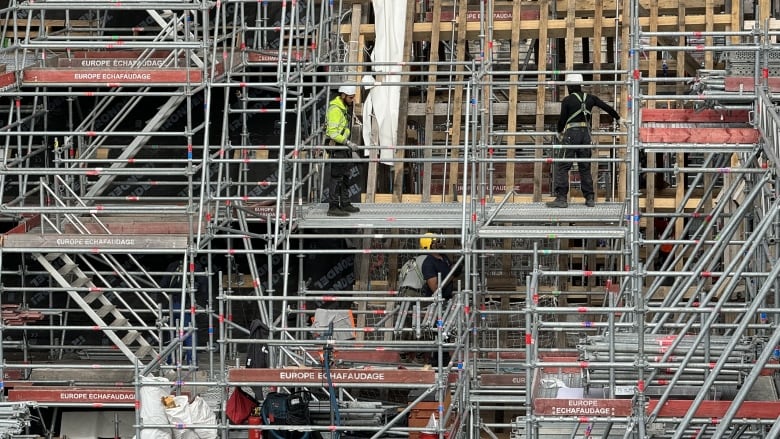
(Stephanie Jenzer/CBC)
The tools used to rebuild the roof span the ages, from modern welding apparatuses to axes forged using medieval techniques, including some from Montreal.
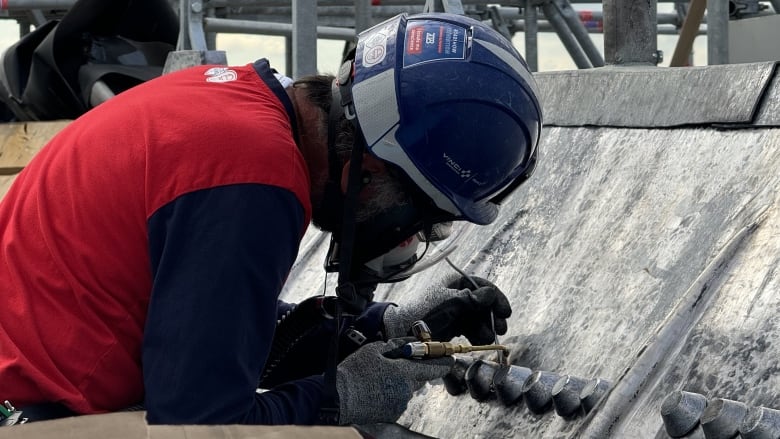
(Stephanie Jenzer/CBC)
The 2019 fire caused the complete destruction of Notre-Dame’s wooden roof. To rebuild, experts searched forests throughout France for thousands of perfect oak trees.
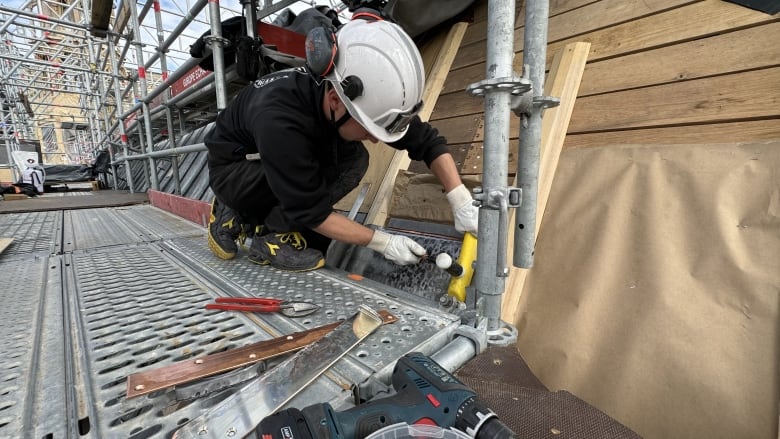
(Stephanie Jenzer/CBC)
After a 2019 fire, workers in Paris have had to re-learn medieval techniques in order to faithfully rebuild the world’s most-recognizable cathedral. Roseline Filion and Hassoun Camara learn about the inspiring Notre-Dame restoration project.
In the spire
A key moment in the rebuilding of the cathedral came last February, when 600 tonnes of scaffolding was removed around the rebuilt spire, re-establishing its distinctive place on the Parisian skyline.
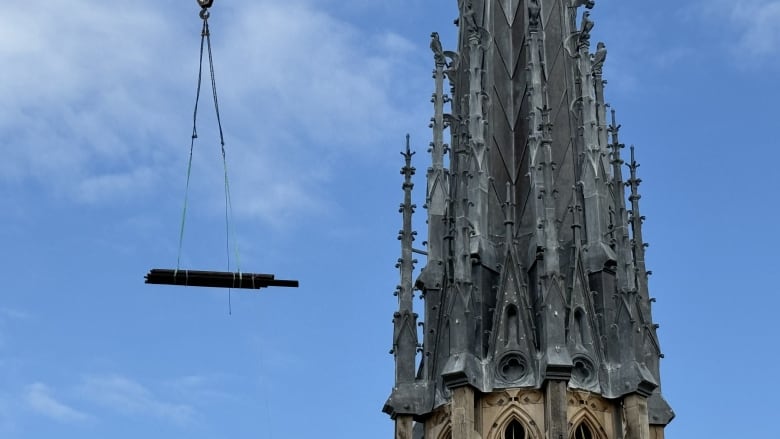
(Stephanie Jenzer/CBC)
A few months earlier, a new emblematic rooster was attached to the spire, with a tube containing the names of more than 2,000 people who contributed to the rebuilding sealed inside the gold-gilded copper sculpture.
(Stephanie Jenzer/CBC)
According to the public organization in charge of rebuilding the cathedral, known as Rebâtir Notre-Dame de Paris, workers from almost 250 companies from across France have joined in the construction and restoration project, including sculptors, glassmakers, scaffolders and — taking a quick break — these carpenters.
(Stephanie Jenzer/CBC)
Inside the cathedral
CBC’s tour of the reconstruction site included the remarkably intact interior of the cathedral. Although the spire and wooden roof collapsed inward, and some of the upper walls of the structure were severely damaged, other sections of the vaulted stone ceiling held — a bit of good fortune that meant major works of art, stained glass windows and religious items largely survived.
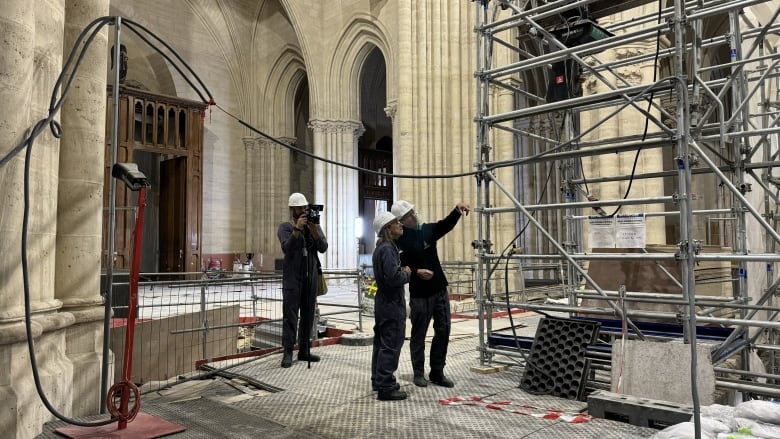
(Stephanie Jenzer/CBC)
All of the interior spaces, including these choir stalls, will be thoroughly cleaned — and touched up, if they were damaged — by the time the cathedral reopens.
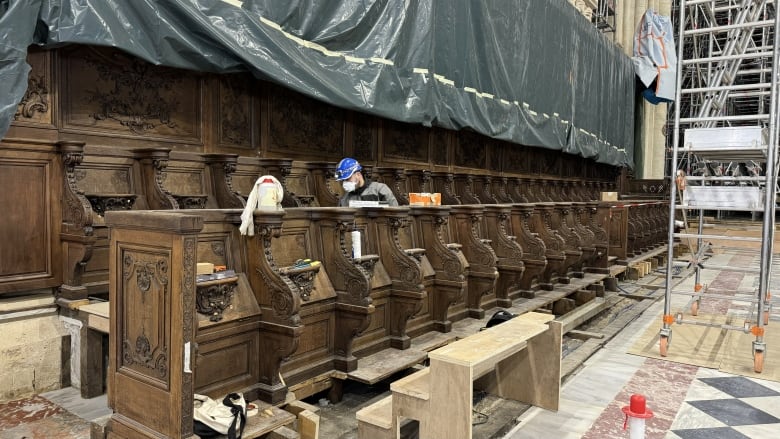
(Stephanie Jenzer/CBC)
A billion-dollar repair
Rebâtir Notre-Dame de Paris says the cost of rebuilding and restoring the cathedral is expected to be about 700 million euros — that’s more than $1 billion Cdn. It said donations will likely cover the bulk of the costs. And in fact, most of those donations came in during the first dramatic hours and days following the fire.
(Stephanie Jenzer/CBC)
The week CBC News visited the site in early June, workers were installing the ornate ridged crest of the roof above the nave and choir of the cathedral. Each crest measures more than a metre wide, and weighs more than 300 kilograms. They were moved into place by crane.
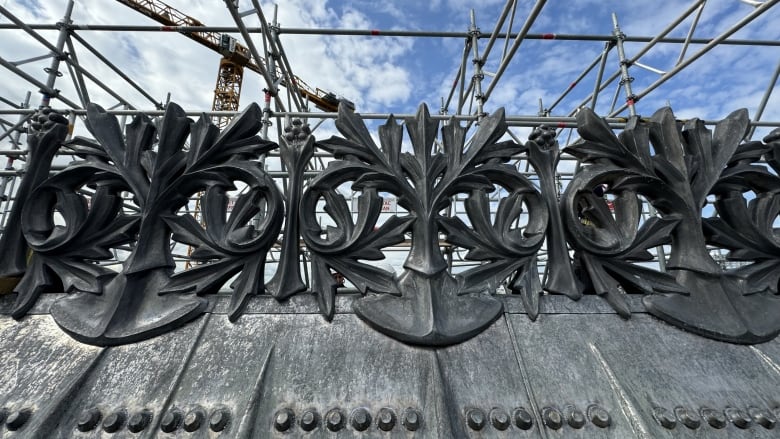
(Stephanie Jenzer/CBC)
Sheets of sand cast lead are meant to protect the roof of the cathedral from severe weather conditions.
(Stephanie Jenzer/CBC)
Philippe Jost is leading the rebuilding and restoration project, and promises visitors won’t be able to tell where the fire burned — what is new and what has been restored. “It’s very important that we feel the monument has 860 years,” he explained to CBC News chief correspondent Adrienne Arsenault. “It’s cleaned, but it doesn’t look as something new.”
(Stephanie Jenzer/CBC)
The first two years after the fire in 2019 were spent securing the structure. Since then, the rebuilding and restoration has progressed non-stop. While reopening to the public is set for December, work will continue on the grounds around the cathedral until 2028.
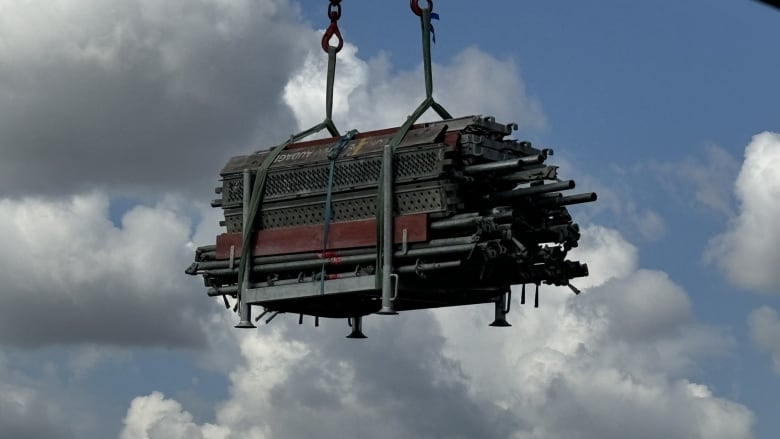
(Stephanie Jenzer/CBC)
